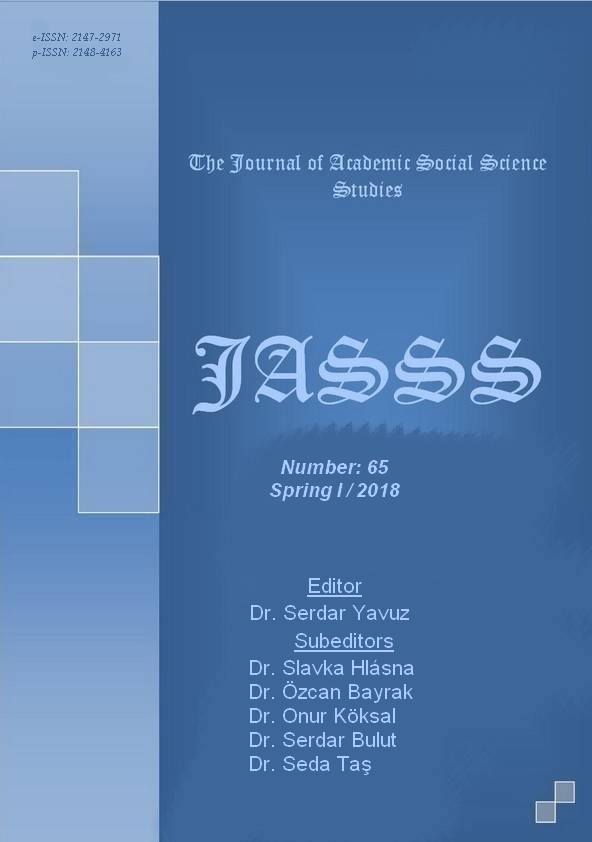OSMANLI-İRAN MÜNASEBETLERİNDE HUDUT BOYLARINDAKİ KÜRT AŞİRETLERİNİN İLTİCA VE DEHALET MESELESİ (1850-1900)
Author :
Abstract
19. yüzyılda Osmanlı ve İran devletleri arasındaki hudut anlaşmazlıklarını körükleyen ve hatta iki devleti savaşın eşiğine getiren temel neden Kürt aşiretlerinden kaynaklanan meselelerdi. İki devlet arasında Kürt aşiretlerinden kaynaklanan en önemli meselelerden biri de iltica meselesiydi. Osmanlı-İran hudut boylarında ikamet eden Kürt aşiretleri, tebaası oldukları devletle menfaatleri örtüşmediğinde bazı bahaneler öne sürerek karşı devlete iltica ve dehalet talebinde bulunmaktaydılar. İltica ettikleri devletin topraklarında da umduklarını bulamadıklarında veya yönetimle araları iyi olmadığında bu sefer tekrar eski yurtlarına dönme talebinde bulunmaktaydılar. Dönme arzusunda olduklarını eski tebaası oldukları devlete aracılar vasıtasıyla bildirdiklerinde çoğu zaman bu talepleri olumlu karşılanmış ve hatta kendilerine teminatlar dahi verilmiştir. Çünkü devlet için iltica eden bir aşiret, aynı zaman da asker ve vergi kazanımı ve boş olan yerlerin imar edilmesi anlamlarına gelmekteydi. Ayrıca iki devlet arasında 1843 ve 1847 yıllarında imzalanan I. ve II. Erzurum antlaşmalarındaki hükümler ve ihtilaflı yerler meselesi Kürt aşiretlerinin hudut boyundaki ehemmiyetini artırmıştı. Devletler kendilerine yapılan dehalet ve iltica taleplerine olumlu bakıp bu hususta bazı teşebbüslerde dahi bulundukları halde tebaaları olan aşiretlerin, diğer bir devletin topraklarına iltica etmelerine izin vermemişlerdir. İltica niyetinde olan tebaalarını bu arzularından döndürebilmek için vaat ve mükâfatlar da bulunarak onlardan taahhütler almışlardır. Ancak bazen verilen vaat ve mükafatlar aşiretleri geri dönmeye ikna edememekteydi. Böyle durumlarda ise devlet, askeri gücünü kullanmak zorunda kalabiliyordu. Askeri güçten istifade ederek aşiretleri eski topraklarına döndürmek aslında sık başvurulan bir tedbir değildi. Bölgedeki mahalli idareciler ve nüfuzlu kişilerin, karşı devlete iltica etme niyetinde olan aşiretin nezdine gönderilmesi, teminatlarla ve hoş sözlerle aşiretin ikna edilmesi daha sık başvurulan tedbirlerdendi.
Keywords
Abstract
The main reason that fueled the border disputes between the Ottoman and Iranian states in the 19th century and even brought the two states to the brink of war were the issues that stem from the Kurdish tribes. One of the most important issues arising from Kurdish tribes between the two states was the issue of asylum. The Kurdish tribes residing in the Ottoman-Iran borders were demanding asylum and deportation to the opposing state by putting forward some excuses when their interests did not overlap with the state they were subject to. When they did not find their hopes in the asylum of the state they were seeking, or when they did not have good relations with the administration, they were in the process of returning to their former homeland. These requests were often welcomed and even they were given assuranc”es when they reported to the state that they were in the position of returning, through their intermediaries. Because, for the state a tribal asylum seeker meant the military and tax return and the reconstruction of empty places. Furthermore, between the two states, between 1843 and 1847, The provisions of the Treaty of Erzurum and the issue of disputed places increased the importance of Kurdish tribes throughout the border. States did not allow the tribes, who were citizens of them, to refuge the land of another state, even if they were in some undertakings and they saw positively refuge and asylum claims made to them. They made promises and rewards in order to be able to turn back down their citizens who are aspiring to asylum from these desires. Sometimes, however, promises and rewards were not able to persuade the tribes to return. In such cases, the state was forced to use its military power. Turning the tribes back to their former lands by taking advantage of military strength was not a commonly appealed measure. The local authorities and influential people in the region are sent to the tribe who are willing to seek refuge in the counter-state, and convincing the tribe with guarantees and pleasant words is a more frequent treatment.
